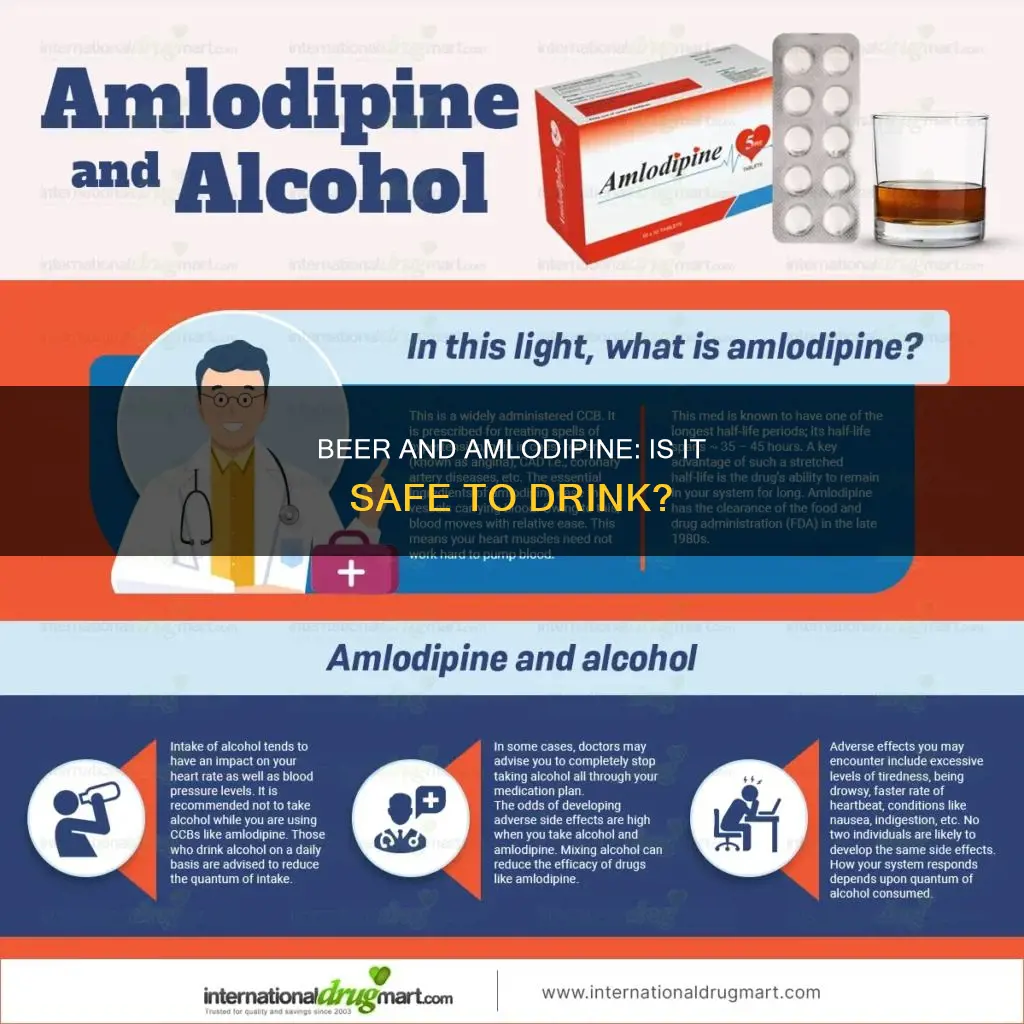
Amlodipine is a medication used to treat high blood pressure and angina. It is part of a group of drugs called calcium channel blockers, which work by relaxing and widening blood vessels. While it is possible to drink alcohol while taking amlodipine, it is generally not recommended to mix the two. This is because both amlodipine and alcohol can lower blood pressure, and combining them may amplify this effect, leading to low blood pressure (hypotension) and other side effects such as dizziness, lightheadedness, fainting, and changes in pulse or heart rate. Excessive alcohol consumption while taking amlodipine may also lead to serious health consequences, especially during the initial phase of treatment. Therefore, it is generally advisable to avoid or limit alcohol consumption while taking amlodipine and to consult a healthcare provider for personalised advice.
| Characteristics | Values |
|---|---|
| Can you drink beer while taking amlodipine? | Yes, but it is not recommended due to the increased risk of side effects such as dizziness, lightheadedness, low blood pressure, decreased effectiveness of amlodipine, and cardiovascular events. |
| What are the side effects of mixing amlodipine and alcohol? | Headache, dizziness, lightheadedness, fainting, changes in pulse or heart rate, flushing of the skin, high blood sugar levels, heart rhythm problems, trouble sleeping, depression, anxiety, sexual dysfunction, increased liver toxicity, and elevated liver enzymes. |
| How much alcohol is considered excessive when taking amlodipine? | Excessive alcohol consumption is generally defined as more than two drinks per day for men and one drink per day for women. |
| What are the risks of drinking alcohol while taking amlodipine? | The combination of amlodipine and alcohol can increase the risk of side effects, especially during the initial phase of treatment or after a dose increase. It may also lead to serious health consequences like cardiovascular events and increased liver toxicity. |
| What should you do if you experience side effects? | If you develop side effects, consult your doctor, especially if the symptoms do not go away after a few days or become troublesome. Avoid driving or operating hazardous machinery until you know how the medications affect you. |
What You'll Learn

Amlodipine and alcohol may lower blood pressure too much
Amlodipine is a type of medicine called a calcium channel blocker. It works by relaxing and widening blood vessels, which lowers blood pressure and makes it easier for the heart to pump blood around the body.
Mixing amlodipine with alcohol may have additive effects in lowering your blood pressure. This can lead to low blood pressure or a decrease in the effectiveness of amlodipine. The side effects of mixing amlodipine and alcohol may include:
- Headache
- Dizziness
- Lightheadedness
- Fainting
- Changes in pulse or heart rate
- Cardiovascular events
- Liver toxicity
- Skin flushing
- Fast heartbeat
- High blood sugar levels
- Heart rhythm problems
- Trouble sleeping
- Depression
- Anxiety
- Sexual dysfunction
These side effects are most likely to occur at the beginning of treatment, following a dose increase, or when treatment is restarted after an interruption. It is important to note that excessive alcohol consumption can damage the liver, where amlodipine is processed, potentially leading to increased liver toxicity or exacerbating existing liver conditions.
To minimize risks, it is generally recommended to avoid or limit alcohol consumption while taking amlodipine. If you choose to drink alcohol, it is important to do so in moderation and consult with your healthcare provider for advice tailored to your specific medical history and other medications.
Beer and Gastritis: What You Need to Know
You may want to see also

Side effects of mixing amlodipine and alcohol
Mixing amlodipine and alcohol can increase the risk of side effects such as lightheadedness, dizziness, low blood pressure, or decreased effectiveness of amlodipine.
Overlapping side effects
The side effects of amlodipine and alcohol may overlap and be amplified when the two are combined. Amlodipine and alcohol can both cause an increase or decrease in blood pressure, which may lead to low blood pressure when they are mixed. This can result in the following side effects:
- Lightheadedness
- Dizziness
- Fainting
- Headache
- Changes in pulse or heart rate
Rare but serious side effects
Rare but serious side effects of mixing amlodipine and alcohol include:
- Fast heartbeat (tachycardia)
- High blood sugar levels (hyperglycemia)
- Heart rhythm problems
Long-term effects
Long-term alcohol abuse and a high dosage of amlodipine may increase the risk of adverse effects such as trouble sleeping, depression, anxiety, or sexual dysfunction. Mixing amlodipine and alcohol can also affect the liver, as both substances are processed by the organ. Drinking excessive amounts of alcohol can cause liver damage, and when mixed with amlodipine, there may be a potential for increased liver toxicity.
Beer Drinking Without Weight Gain: Is It Possible?
You may want to see also

Increased risk of liver damage
Drinking alcohol while taking amlodipine can increase the risk of liver damage. Amlodipine is processed in the liver, and excessive alcohol consumption can damage this organ, potentially leading to increased liver toxicity. This combination may also elevate liver enzymes, which are markers of liver injury.
Excessive alcohol consumption can cause a condition called alcoholic liver disease, characterised by liver damage. When combined with amlodipine, there is a potential for increased liver toxicity. This is because amlodipine is heavily processed in the liver, and the drug can cause elevations in liver enzymes. Therefore, people with existing liver diseases or those who consume excessive amounts of alcohol should avoid or limit their alcohol intake while taking amlodipine.
In addition, long-term heavy alcohol use can lead to severe liver damage. It is crucial to monitor any changes in liver enzymes while taking amlodipine and alcohol together. If you experience any unusual symptoms, it is essential to report them to a healthcare professional.
The interaction between amlodipine and alcohol can also increase the risk of other adverse effects, such as low blood pressure, dizziness, lightheadedness, fainting, flushing of the skin, and changes in pulse or heart rate. These side effects may be more likely during the initial phase of treatment, following a dose increase, or when restarting treatment after an interruption. It is important to consult a doctor if these symptoms persist or become troublesome.
To summarise, drinking alcohol while taking amlodipine can increase the risk of liver damage due to the potential for increased liver toxicity and elevated liver enzymes. It is crucial to monitor liver health and consult a healthcare professional for tailored advice regarding alcohol consumption while taking amlodipine.
Beer and Periods: A Healthy Mix?
You may want to see also

Amlodipine and alcohol may cause heart rhythm problems
Amlodipine is a medication used to treat high blood pressure and angina. It is a calcium channel blocker, which means it relaxes and widens blood vessels by blocking calcium from entering the muscles in the heart and blood vessels. This leads to a decrease in blood pressure and makes it easier for the heart to pump blood around the body.
When it comes to drinking alcohol while taking amlodipine, it is important to understand the potential risks and side effects. Alcohol can also lower blood pressure and affect heart rate, so mixing it with amlodipine can increase the risk of certain side effects.
One of the most serious potential side effects of combining amlodipine and alcohol is the increased risk of heart rhythm problems. This is because both substances can impact the heart rate and blood pressure. Amlodipine works by lowering blood pressure, and alcohol can have a similar effect, especially when consumed in large quantities. This additive effect can lead to a dangerous drop in blood pressure, known as hypotension.
Additionally, the combination of amlodipine and alcohol can cause other side effects such as dizziness, lightheadedness, fainting, flushing of the skin, and changes in pulse or heart rate. These side effects may be more likely to occur at the beginning of treatment with amlodipine, following a dose increase, or when treatment is restarted after an interruption. It is important to note that the occurrence and severity of these side effects can vary depending on factors such as the dosage of amlodipine, the amount of alcohol consumed, and the timing of consumption relative to taking amlodipine.
To minimize the risk of heart rhythm problems and other side effects, it is generally recommended to avoid or limit alcohol consumption while taking amlodipine. Excessive alcohol consumption, in particular, may lead to serious health consequences, including cardiovascular events and increased liver toxicity. It is always a good idea to consult a healthcare professional for advice tailored to your specific medical history and other medications.
Baylor Football: Beer Drinking Allowed?
You may want to see also

Amlodipine and alcohol may increase the risk of cardiovascular events
Amlodipine is a medication that treats high blood pressure and angina. It belongs to a group of drugs called calcium channel blockers, which work by relaxing and widening blood vessels, making it easier for the heart to pump blood around the body.
When it comes to drinking alcohol while taking amlodipine, it is important to understand the potential risks involved. Excessive alcohol consumption can negatively impact the liver, where amlodipine is processed, leading to increased liver toxicity and exacerbating pre-existing liver conditions. This is especially important to consider as amlodipine is already heavily processed in the liver, and any additional stress can have adverse effects.
Additionally, amlodipine and alcohol may have additive effects in lowering blood pressure. This can result in side effects such as dizziness, lightheadedness, fainting, changes in pulse or heart rate, and increased risk of cardiovascular events. These side effects are most likely to occur at the beginning of treatment, following a dose increase, or when treatment is restarted after an interruption. It is crucial to consult a doctor if these symptoms persist or become troublesome.
Furthermore, excessive alcohol consumption can lead to serious health consequences, especially during the initial phase of amlodipine treatment. The combination of amlodipine and alcohol may increase the risk of cardiovascular events, such as heart attacks or strokes. Therefore, it is generally recommended to avoid or limit alcohol consumption while taking amlodipine. Consulting a healthcare provider is essential to receive tailored advice based on medical history and other medications.
The Magic of Beer: Trapping Pests with Fermentation
You may want to see also
Frequently asked questions
It is not recommended to mix amlodipine and alcohol. Amlodipine and ethanol may have additive effects in lowering your blood pressure, which can lead to side effects such as dizziness, lightheadedness, fainting, and changes in pulse or heart rate.
The side effects of drinking beer while taking amlodipine can include dizziness, lightheadedness, fainting, changes in pulse or heart rate, headache, flushing of the skin, and increased liver toxicity.
It is generally recommended to avoid drinking alcohol while taking amlodipine. However, if you choose to drink, it is important to do so in moderation, as excessive alcohol consumption may increase the risk of serious health consequences.
Moderate drinking typically means two drinks or fewer per day for men and one drink or fewer per day for women.
If you experience side effects from drinking beer while taking amlodipine, it is important to let your doctor know. Do not stop taking any medications without first consulting your doctor. Avoid driving or operating hazardous machinery until you know how the combination of amlodipine and alcohol affects you.







